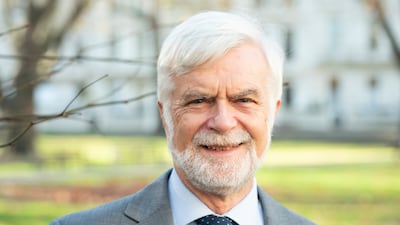A British scientist is bidding to lead the UN’s expert panel on climate change, with a vow to listen to developing countries who have had to leave crunch talks to catch flights home from Europe.
Professor Jim Skea told The National that the current trajectory of more than 3°C of global warming would take humanity into a “new kind of world” marked by floods, intense storms and problems with food production.
Poorer countries will face the greatest hazards, according to the UN’s Intergovernmental Panel on Climate Change, which reports to leaders on the state of scientific knowledge about the planet.
Prof Skea, a co-author of the IPCC’s reports and one of four candidates to be its next chairman, said there could be irreversible losses even if the temperature rise is eventually capped at 1.5°C above pre-industrial levels.
The most recent IPCC report in March said it was unequivocal that humans had already caused about 1.1°C of global warming and billions of the world’s people were “highly vulnerable” from climate change.
But talks in Switzerland on finalising the report overran for two days and “many developing countries were not in the room because they were on fixed-price tickets that sent them back home again,” Prof Skea said.
“We need to make sure the IPCC draws on the widest range of people,” he told The National during climate change talks in Bonn, Germany, that are preparing the ground for Cop28 in the UAE.
"The inclusivity issues are a big issue, making sure that countries from all kind of backgrounds contribute."
Prof Skea’s candidacy is backed by the UK government, which has called him a world-renowned expert with an “unparalleled depth and breadth of scientific expertise”.
The other three candidates are Jean-Pascal van Ypersele of Belgium, Thelma Krug of Brazil and Debra Roberts of South Africa, with a new chairperson to be chosen in July to replace South Korea’s Hoesung Lee.
An expert on sustainable energy at Imperial College London, Prof Skea said private finance was needed to mobilise the trillions of dollars that a green overhaul of the world economy is expected to cost.
The UAE has spoken of bringing together an “inclusive mix of players” including the private sector at Cop28. The summit begins at Dubai’s Expo City on November 30.
“We’re talking in the trillions a year. Quite frankly, public sector pockets are not deep enough to do that,” Prof Skea said. “It absolutely involves leveraging private sector money.”
Prof Skea has been involved in discussions on the “global stocktake”, a first-of-its-kind health check on global climate policies that will conclude at the summit in the UAE.
The IPCC said in its March report that current policies are not being implemented fast enough and would lead to global warming of about 3.2°C by the end of the century.
The global target, agreed in Paris in 2015, is to keep the rise to 1.5°C above pre-industrial levels, although this could involve first overshooting the target then bringing temperatures back down by 2100.
Negotiations have highlighted the fact that the cost of producing solar and wind energy has fallen substantially but that many countries still lack the grid infrastructure to bring in renewables.

The energy squeeze resulting from Russia’s invasion of Ukraine has at the same time prompted countries such as Germany to build new gas infrastructure that activists say risks locking in more emissions.
Options under discussion in talks leading up to Cop28 have included a global renewable energy target, backed by Germany, and using carbon prices to shift money away from fossil fuels.
Prof Skea says he expects the Dubai summit to be less of a headline-grabbing milestone and more of a “hard grind of negotiating work” that is “absolutely critical if we're going to move things forward”.
Meanwhile, the effects of climate change such as wildfires, storm activity and damage to corals in the ocean are becoming visible even at the 1.1°C of warming already reached, he said.

While it would be possible to overshoot 1.5°C and try to dial temperatures back by removing CO2 from the atmosphere, scientists warn that some changes such as species loss and rising sea levels will be irreversible.
Another concern is that tactics to remove CO2, such as planting trees or growing crops to make energy, might only worsen environmental problems around land use and food availability.
Prof Skea said modelling is limited on the impact of such an overshoot and said it would be better to stop the temperature rise in its tracks before the worst-case scenario is reached.
“By the time you get to 3°C, you're seeing all kinds of other risks emerging at a much higher level. There's the impacts of flooding, sea level rise, increased storm activity, greater storm intensity,” he said.
“At 3°C, you would start to see negative impacts on crop yields and food production. 1.5°C has enough [impacts]. 2°C would be worse, but 3°C is really taking us into a new kind of kind of world.”


